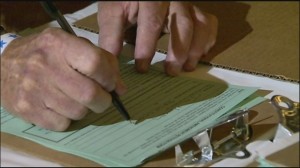One of the last surviving attempts to put legalization on the November ballot is officially dead, though it was given up for as much weeks ago. That leaves just one petition in the running, and that doesn’t have a chance.
 The California Cannabis Hemp Initiative, which would have legalized the possession and cultivation of almost unlimited amounts of weed, failed to clear the ballot, according to the secretary of state’s office.
The California Cannabis Hemp Initiative, which would have legalized the possession and cultivation of almost unlimited amounts of weed, failed to clear the ballot, according to the secretary of state’s office.
The initiative, one of four that sought to offer voters a path to legal weed this year, was never given good odds. It lacked serious financial backing, it was supported almost entirely by industry insiders, and the regulations it proposed were so lax it was unlikely to attract the millions of moderate voters needed to become law.
Berton Duzy, spokesman for the failed campaign, said the group will return for more in 2016. Several groups are already working on a major initiative for that year, but it isn’t yet clear whether the effort will unite cannabis interests or pit them against each other again.
The movement is deeply split in California after this year. Insiders feel politicians, eager to please everyone, are ignoring their concerns. Political leaders, on the other hand, feel the insiders are unrealistic and willing to sabotage the whole game just to make a point.
Case in point: The California Cannabis Hemp Initiative would have allowed possession of up to 12 pounds of marijuana, as well as cultivation of up to 99 plants. Those amounts would essentially allow any adult in the state to become a dealer.

Another of the four initiatives proposed no limit on possession or cultivation, leaving that up to a state panel stacked with members of the marijuana industry. That initiative was withdrawn earlier this year.
Though insiders doubtless loved these proposals, they were never likely to garner many votes outside of that community. Even if they had, the federal government likely would have stepped in to prevent them from taking effect.
Medical marijuana is legal under California state law, and Colorado and Washington State have legalized recreational pot, but all weed is illegal under federal law. The Department of Justice announced in August that it would not interfere with states that legalize as long as they enforce certain federal priorities, such as making sure the drug doesn’t flow to other states.
A system with no legal limits on possession or cultivation would produce so much weed a fair amount of it would naturally cross state lines. The Obama administration almost certainly wouldn’t tolerate this.
Another initiative, proposed by the Drug Policy Alliance, was withdrawn after the group decided it couldn’t pull together the funding for a major political campaign. That group is expected to return with significant support in 2016.
 The fourth and final petition, the Marijuana Control, Legalization and Revenue Act, is currently gathering voter signatures in order to get on the ballot. That organizaiton has an April 18 deadline.
The fourth and final petition, the Marijuana Control, Legalization and Revenue Act, is currently gathering voter signatures in order to get on the ballot. That organizaiton has an April 18 deadline.
But it’s highly unlikely the group will make it; the effort was widely written off weeks ago. Members have none of the several million dollars necessary for a successful campaign, and they’ve only gatherd 10,000 of the 500,000 signatures they need.
“We’re still looking for a miracle,” said backer David Hodges.
 California Marijuana Market Breaking "Marijuana News" from CA
California Marijuana Market Breaking "Marijuana News" from CA


